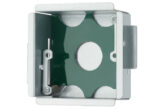
Paul Dawson, Commercial Director at Niglon, explains why he believes the education message around the use of electrical accessories to protect operators needs to go viral.
What does the phrase ‘antiviral’ mean to you? Just think about it for a moment.
Now, did you realise there are materials being marketed as antiviral right now which are actually effective against a type of virus which isn’t necessarily harmful to humans? Or that ‘kill rates’ of different viruses can vary significantly, even when placed on the exact same product surface?
The team here at Niglon isn’t prepared to take the ‘antiviral’ messaging that we’re all currently being bombarded with at face value. And we won’t risk our name and reputation up-selling a product which purports a tangible user benefit, if it is in fact questionable. That wouldn’t be genuine or responsible, and it’s not how we conduct business. That’s why we’ve engaged with leading experts from the University of Manchester to further our knowledge about how viruses act on surfaces, and commissioned testing on our own products as well as some other manufacturers’ within our market. We want to uncover the truth behind these claims while educating ourselves and like-minded customers on this topic, for the greater good of the industry.
When ‘antiviral’ and similar buzzwords started popping up within industry advertising, inferring that products such as light switches can actually help reduce virus transmission, I wanted us to understand the science behind those claims. We needed to explore whether individuals are being misled and potentially put at risk, because the ‘antiviral’ message some companies promote doesn’t always perfectly reflect the scientific reality. Opaqueness does not breed reassurance and naturally a lot of the public do not understand or appreciate this area; virology is a field of study all of its own for good reason.
Concerning results
What’s clear is that there is the possibility that contractors who’ve worked on projects where ‘antiviral’ products have been specified and installed to keep users safe, may not have been provided with sufficient detail by manufacturers to enable them to make informed purchasing decisions. And as we know, the devil is always in the detail.
A switch plate which is deemed ‘antiviral’ might suggest to some that you can’t pick up any type of virus from touching it. Others may instantly equate antiviral to anti-Covid19, given the history of recent events. In reality the situation is far more nuanced, with those outside of a science background unlikely to be well enough informed and at greater risk of being misled. Or maybe some manufacturers don’t even know the science themselves. Now there’s a sobering thought!
Where’s your proof?
Through our research and expert consultations, we’ve learned there are different types of viruses (enveloped and non-enveloped): those that use human cells as their host and those that affect bacteria. The ones that use bacteria as their hosts are known as bacteriophages, or phages, and they actually live harmlessly within most of our guts. In fact, there are trials across the world where they’re being used to target drug-resistant bacteria as an alternative to antibiotics – showing they’re not only harmless to humans, but in some cases can actually be beneficial.
ISO21702:2019 is the standard recognised for testing antiviral efficacy on plastic and other non-porous products, like electric light switches and socket plates. This testing regime allows for substitute viruses like phages to be used (perfectly legitimately, we must add), instead of the really harmful viruses, which can spread easily. Indeed, their structure often emulates a human virus very well, which is another reason why they are used as substitutes. But our test results showed a notable difference in the rate at which a virus is neutralised from a surface (the aforementioned ‘kill rate’) depending on whether a phage or mammalian virus (which impacts us humans) was used. Some products may significantly reduce the transmission of a phage but not a mammalian virus. So, they’re ‘antiviral’ when it comes to phage, but not when it comes to viruses that impact mammals.
Technically these products may be legitimately described as antiviral, but are they going to stop you or me getting a form of human-transmissible Coronavirus? The answer is to always ask that question; otherwise, it may be wiser to assume not. Another key point to make from our research is that there is no silver bullet when it comes to antiviral efficacy. One virus can be affected very differently to the next, so do treat any such overarching claim with extreme caution.
Also be sure to check the contact time (how long the test was conducted over) and consider if that will be suitable for the application you had in mind; a 24-hour contact time may be suitable in an outbuilding or less trafficked area, but in areas of high footfall with the potential for high virus transmissions you may want to opt for a product that will reduce virus efficacy over a much shorter period, for instance four hours, or even less.
We believe all antiviral claims should be accompanied by specifics; which particular virus strains have been tested, on what product, for how long, and under what test conditions. Nothing less than total transparency will do, especially when it’s people’s health at stake.
What does this mean for us?
We’ve made the decision that we are categorically not going to state our products are ‘antiviral’ until we are truly confident that they actively reduce transmission of certain viruses that cause illness to human beings. This is what we believe our customers would understand from the term, and the action they would expect any responsible and trustworthy company to take.
We’re continuing our investigative work focused on potential modifications to materials or coatings, which could lead to that outcome, so it may be something we’re able to bring to the industry in the near future. And when we get to that point, we’ll be sure to include all the specifics, including which mammalian viruses that product is effective against (such as Covid-19), and even why we have sought to test against those particular virus strains.
What does this mean for you?
If you’re considering installing a product based on the claim it is ‘antiviral’ then I’d strongly encourage you to do some research into exactly what this means. Gen up, and ask questions.
Some points you may wish to clarify with the product manufacturer include:
● Do they list the test standard and virus type tested against?
● What is the percentage kill rate, and over what timeframe?
● Which (if any) substitute/phage viruses were used in testing, and are they effective against limiting human virus transmission?
● Are their products specifically effective against Covid-19?
● Will they share with you their test reports?
Don’t be afraid to ask as many questions as you feel you need. And if the manufacturer is unable or unwilling to back up their claims, consider just how honest and open they’re being in using the ‘antiviral’ label in their advertising, product literature, or packaging.
Niglon has produced a free guide based on its research and testing, to help explain some of the key terms around the subject.
To browse the free Niglon guide online click here










